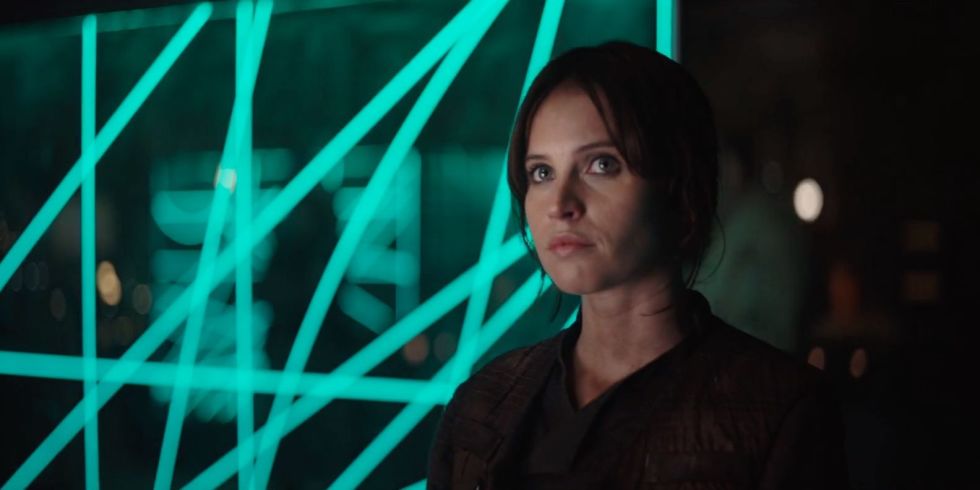I recently saw the new “Captain America” movie, and while that’s almost entirely irrelevant, it was A) a pretty damn good movie, and B) the first time I saw the new “Rogue One” trailer, which is the relevant part. The trailer does its job—my friend and I left the theater ridiculously hyped for the movie’s December release—but it does something even more amazing: It passes the Bechdel test in only a minute and fifty eight seconds, something many movies don’t even manage in two hours.
The Bechdel test, popularized by writer and comic artist Allison Bechdel in the 1980’s in her comic “Dykes to Watch Out For,” asks whether a movie features two or more (preferably named) women who talk to each other about something other than a man. Some later variants of the rule that I’ve seen also include a line requirement, but at the most basic level, all the movie needs to pass is two women talking about anything other than a man.
To me, it seems like the test should be passed with flying colors in every movie, mainly because I don’t think it’s that high of a bar to reach. I won’t deny that women in real life talk about men, because sure, we do, but there are also a million other things we talk about, and if it’s a goal of filmmakers is to create well-rounded, relatable characters, that goal is not being met by the women in most films. The original “Star Wars” trilogy and “Indiana Jones” movies are my go-to examples: They’re classic films that most people have seen and have been absorbed into popular culture, yet not one of the six films pass this test. Leia and Marion Ravenwood are really solid attempts at strong female characters, but they are the only named women in their respective movies (aside from Luke’s Aunt Beru, who never interacts with anyone other than Luke and her husband), and this lack of female interaction is something that largely goes unnoticed.
I read one of Allison Bechdel’s graphic novels for a class my freshman year of college, and some background research on her and the rest of her work led me to her comic “The Rule” (linked above) and the existence of this test. Mentally going through all the media I’d consumed and checking it against the author’s eponymous test was exhausting to say the least, because most of the media I’d consumed hadn’t passed it, and I had never even thought about it before. I had heard people say things like “two dimensional characters” and “undeveloped female leads” and never really understood what they meant, so I tried not to let it affect my movie-watching experience.
Now, as a result of reading and learning about the Bechdel test and the myriad problems it exposes, I can’t watch anything without my experience being affected by it. I question every single movie I watch or book I read, applying them to the test and seeing how the women are treated in general, both by the characters and the writers. Spoiler alert: They are often treated poorly.
For instance, Leia and Marion Ravenwood both appear, on the surface, to be exempla of “strong female characters.”
However, as I mentioned before, they are the only named women in their movies, which places them squarely in the position of the male hero’s love interest, and despite how often their badassery may save the male hero, they are shown as a kind of prize to be claimed upon completion male quests.
Maybe I would have reached this point of critical thinking (and perhaps cynicism) on my own eventually, even without having read about Bechdel and her work, but I remain convinced that reading her comic was a turning point for me.
The Bechdel test is by no means an extensive, conclusive measure of how feminist a movie is; there are several articles I’ve found illuminating this point, and illuminating it well (like this one). That being said, the Bechdel test has been, for me, a gateway to thinking critically about how women are portrayed and treated in the media we consume all the time without even batting and eye, as well as how other people are thinking (or maybe not thinking) about the same issues.
When I got back from “Captain America,” for example, I told my parents how excited I was about “Rogue One” passing Bechdel in the trailer, and they both just looked at me blankly.
Even after I had explained the test and why it matters, my dad shrugged and told me he doesn’t ever think about things like that when he watches movies—he just cares about being entertained. In my dad’s defense, most of my life as a humanities student is spent picking apart and analyzing media with a fine tooth comb, and Santa Cruz is a fairly liberal university, so it’s almost impossible for me to look at anything without thinking about it in a larger social justice context.
Still, his response still shocked me. Media is so pervasive that it is impossible not to be affected by it.
People—men and women both— are watching movies that treat women like needy, shallow creatures whose lives revolve around men, then internalizing and manifesting that idea in their behavior.
I have two little sisters, and I find it hard to believe that my dad, or anyone really, wants their daughters and sisters walking around in a world that treats women like the submissive spoils of men’s conquests.
Obviously, my coming home and being excited about a movie trailer being progressive isn’t even close to the widespread cultural shift that needs to happen in order to change how women are portrayed in the media, but the fact that the progressive movie even exists is a really good start. The more ubiquitous well-developed, three dimensional female characters become in media, the more obvious it will become when a female character isn’t those things, which hopefully will make people ask why women are treated the way they are, and, in a perfect world, change it.











